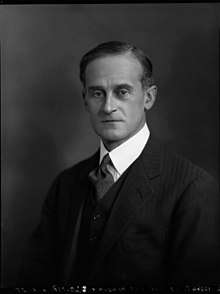Cuthbert Headlam
Sir Cuthbert Morley Headlam, 1st Baronet, DSO, OBE, TD, DL (27 April 1876 – 27 February 1964[1]) was a British Conservative politician.

Career
Born in Barton upon Irwell, Lancashire, Headlam was educated at King's School, Canterbury, and at Magdalen College, Oxford, where he received his BA in March 1900.[2] He was a Clerk in the House of Lords 1897–1924 and became a barrister, Inner Temple in 1906. He served with the Bedfordshire Yeomanry from 1910–1926,[3] was mentioned in despatches in the First World War and awarded the Distinguished Service Order[4] and appointed an Officer of the Order of the British Empire, retiring as lieutenant colonel.
Headlam was elected as Member of Parliament (MP) for Barnard Castle at the 1924 general election.[5] After the loss of his seat in 1929, he stood in the Gateshead by-election in June 1931, coming a close second in what had been a safe seat for Labour. He regained the Barnard Castle seat at the general election in October 1931, but was defeated again at the 1935 general election. He was returned to the House of Commons for a third time at a by-election in June 1940 as MP for Newcastle upon Tyne North, after standing as an "Independent Conservative" and beating the official Conservative Party candidate.[6] He held the seat until he retired from Parliament at the 1951 general election.
He served in government as Parliamentary and Financial Secretary to the Admiralty from 1926–1929; as Parliamentary Secretary to the Ministry of Pensions from 1931–1932; and as Parliamentary Secretary to the Ministry of Transport from 1932–1934.
Headlam was a Durham County Councilor from 1931–1939, and Justice of the Peace for the County of Durham. He was Chairman of the National Union of Conservative and Unionist Associations in 1941. He was created a baronet in the 1935 Birthday Honours and appointed a Privy Counsellor in 1945. He died in Bath, Somerset aged 87.
References
- "Historical list of MPs: constituencies beginning with "B", part 1". Leigh Rayment's House of Commons pages. Archived from the original on 17 November 2013. Retrieved 8 January 2010.
- "University intelligence". The Times (36080). London. 3 March 1900. p. 8.
- "No. 28338". The London Gazette. 11 February 1910. p. 1044.
- "No. 30450". The London Gazette (Supplement). 28 December 1917. p. 22.
- Craig, F. W. S. (1983) [1969]. British parliamentary election results 1918–1949 (3rd ed.). Chichester: Parliamentary Research Services. p. 338. ISBN 0-900178-06-X.
- Craig, op. cit., page 203
Sources
- Parliament and politics in the age of Churchill and Attlee: the Headlam diaries, 1935–1951 (1999), edited by Stuart Ball
External links
- Hansard 1803–2005: contributions in Parliament by Sir Cuthbert Headlam
| Parliament of the United Kingdom | ||
|---|---|---|
| Preceded by Moss Turner-Samuels |
Member of Parliament for Barnard Castle 1924–1929 |
Succeeded by William Lawther |
| Preceded by William Lawther |
Member of Parliament for Barnard Castle 1931–1935 |
Succeeded by Thomas Miles Sexton |
| Preceded by Sir Nicholas Grattan-Doyle |
Member of Parliament for Newcastle-upon-Tyne North 1940–1951 |
Succeeded by Gwilym Lloyd-George |